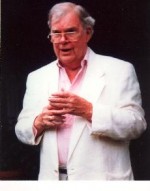Retired Times columnist talks about war, how to correctly practice journalism

By Kenneth Tyler
kenneth.tyler@castleton.edu Retired New York Times journalist and political columnist, Tom Wicker told a packed Herrick Auditorium last week that President Bush should have done a little more research and perhaps learned from his father before invading Iraq.
Wicker is the former writer of the popular “In the Nation” column and worked as a journalist for over 40 years before retiring in 1991. Now, the 79-year-old resident of Rochester, has written a new book titled, The brief arc of Joe McCarthy but spent no time addressing his latest work.
Instead, he focused on the future of journalism, the responsibility of reporters and the war in Iraq.
“The greatest similarity between the Vietnam War and the war in Iraq is that our different governments at the time did not know what they were doing,” Wicker said directly with his soft southern cadence that remains from his North Carolina childhood.
He compared the different administrations in charge of the wars and said they didn’t do enough research into the culture of the countries they invaded.
Wicker said at the end of the first Gulf War, the administration – which included George W. Bush’s father, then secretary of defense Dick Cheney and Colon Powell – they discussed the possibility of invading Iraq and removing Saddam Hussein, but chose not to.
“One of the first and foremost reasons was because they were certain that it would result in civil war,” Wicker said, which he said appears to be happening now.
He then described how, after World War II when Iraq was first established and occupied by the British, the British pulled out of the country because they found it to be “ungovernable.”
Jeanne Albert, who works in the math department at Castleton found these comments to be the most insightful.
“I really enjoyed listening to his comparisons between the time when he was deeply involved in reporting the war and how he sees it now,” Albert said.
Then, in paralleling the two controversial wars again, he stated that one of the pressing issues in Vietnam was the attitude of the administration.
“Their struggle in Vietnam was their struggle against their own rather invincible ignorance,” Wicker said.
As for the differences between the two, Wicker stated the obvious factor of the terrain in which the wars were fought – one in the jungle and the other in the dessert. He also noted the difference back home in America.
“Vietnam evoked an outcry of protests and marches,” Wicker said. “But now we’re not seeing protesting.”
The lifelong journalist began his lecture with his thoughts on what makes a good journalist and how Internet versions of newspapers differ from print versions.
“You miss interesting tidbits that don’t make the online version,” Wicker said about Internet news. “Print has a whole lot more to offer – maybe that’s the problem – people don’t have the time to take it all in.”
He continued his lecture with a message to all the aspiring journalists in the audience – to treat people well.
“You don’t have the right to make fun of anyone,” Wicker said. “Report what happened, you are not to embellish it.”
Throughout the discussion Wicker spoke to the audience with a humble respect for the words he chose. He wouldn’t answer questions unless he was certain he knew every angle and made a point to clarify when he was speaking his opinion and when he was speaking fact.
At one point he was asked about the press treatment President Bush receives.
“With greater deference than disserved,” Wicker said, before continuing with his thoughts on the issue of whether weapons of mass destruction existed. “I don’t question Bush’s sincerity, I think he believed it – I believed it.”
Wicker spoke at the college as part of the continuing Vermont Authors Series and came at the request of Librarian Sandy Duling and Journalism Professor David Blow.




